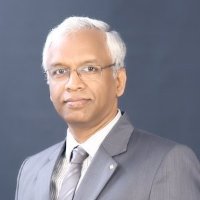
K.V.S. HARI (F) received the B.E., M.Tech and PhD degrees from Osmania University, IIT Delhi, University of California San Diego, respectively. Since 1992, he has been a Faculty Member at the Department of ECE, Indian Institute of Science (IISc), Bangalore, where he is currently a Professor and Chair. He coordinates the activities of the Statistical Signal Processing Lab in the department. His research interests are in developing signal processing algorithms for MIMO wireless communication systems, indoor positioning using inertial sensors, assistive technologies for the elderly, autonomous vehicles, wireless channel modelling and visual neuroscience.
Prof. Hari has been a visiting faculty member at Stanford University, KTH – Royal Institute of Technology and Aalto Univ. He has been an Affiliated Professor in the School of Electrical Engineering, KTH Royal Institute of Technology, Stockholm, Sweden for six years. He also worked at DLRL, Hyderabad, and at the Research & Training Unit for Navigational Electronics, Osmania University. During his work at Stanford University, he worked on MIMO wireless channel modeling and is the co-author of the WiMAX (IEEE 802.16) standard on wireless channel models for fixed-broadband wireless communication systems, which proposed the Stanford University Interim (SUI) channel models.He is an academic entrepreneur and a co-founder of a technology startup, ESQUBE Communication Solutions.
His IEEE professional activities include:
Chair, 2017 IEEE Ad-hoc Committee on India Strategy, appointed by IEEE President; Co-Chair, 2016 IEEE Region 10’s 50 years Celebrations local organization committee, appointed by Region 10 Director; 2016 Chair of IEEE Bangalore Section; Vice Chair, IEEE Bangalore Section (2012, 2013); Elected Member, SPS Signal Processing Theory and Methods Technical Committee-SPTM TC (Jan 2014- Dec 2019); Associate Member, SPS Sensor Array and Multichannel Technical Committee- SAM TC(2010-present); Member, IEEE University Programs Ad-hoc Committee (UPC), IEEE Educational Activities Board (IEEE-EAB; Chair, IEEE SPS Bangalore Chapter (2005, 2011-13); Founding Team Member, IEEE SPS Bangalore Chapter (2001).
Member, IEEE 802.16 working group in the IEEE Standards group; Initiated and co-authored the work for IEEE 802.16 (WiMAX) standard on wireless channel models (1999-2001).
General Co-Chair, 2016 IEEE ANTS – International Conference on Advanced Networking and Telecommunication Systems; General Chair, 2013 and 2014 IEEE International Conference on Electronics, Computing and Communication Technologies (IEEE CONECCT);Organized International conferences (SPCOM series), SP-Connect, an activity for connecting students and technologists; Member, Industry Forum and Exhibition Committee, International Conference on Communications (ICC 2013); Member, Technical Program Committees of several International conferences supported such as IEEE ICC, IEEE CONECCT, EUSIPCO, VTC, and Pernets; Reviewer, IEEE TSP, IEEE SPL, IEEE JSTSP journals and IEEE conferences.
He was awarded the Outstanding IEEE Bangalore Section Volunteer Award in 2014.
His non-IEEE activities include, Editor, EURASIP‘s Journal on Signal Processing (2006–2016) and Senior Associate Editor, Sadhana-Proceedings of Indian Academy of Science in Engineering Sciences (Springer) (2013- present); Chair, Expert Group, constituted by the Department of Telecommunications (DOT), Government of India, to study the interference of satellite signals on WiMAX in the 2.5-2.7GHz. This group included members from the DOT, Indian Space Organization, WiMAX Forum, Samsung, Huawei, Intel, WCAI(US), KDDI(Japan) (2009- 2011). The work was important in the context of spectrum auctions in India, (2009-2011); Member, Technical Committee of Asia Pacific Signal and Information Processing Association (APSIPA) (2010-present); Member, Governing Council, DOEACC, Ministry of Information Technology, Govt. of India (2001-05), whose responsibility was to shape the curriculum of several courses offered by DOEACC to improve effective delivery of Electrical Engineering education material, throughout India.
Prof. Hari is a Fellow of IEEE, Fellow of IETE (India) and Fellow of Indian National Academy of Engineering (INAE).